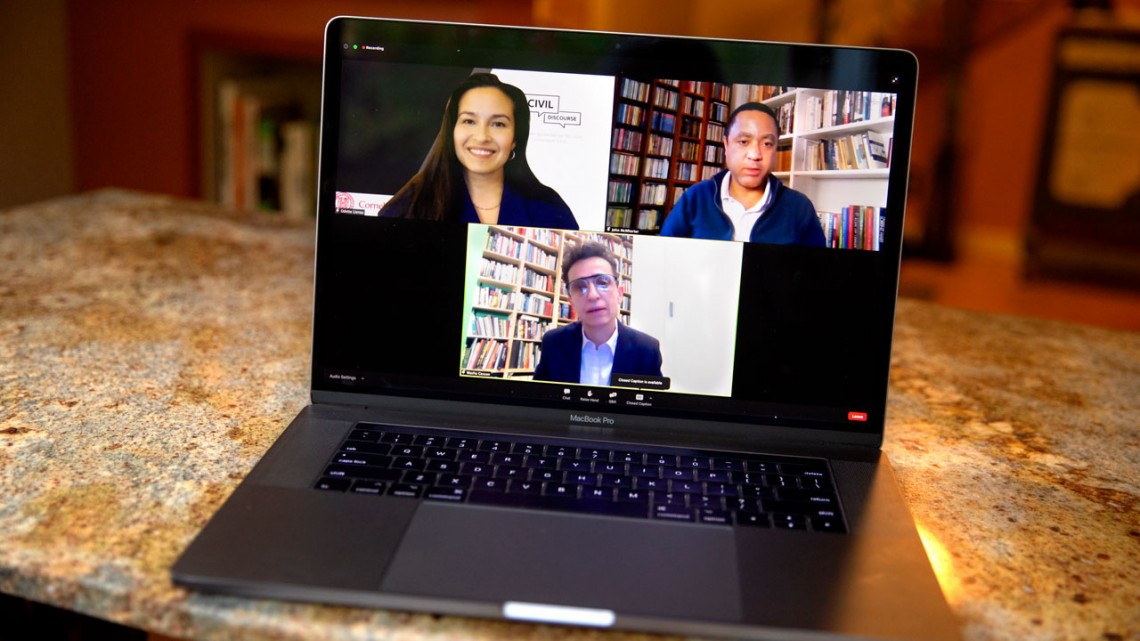
Journalist Masha Gessen, bottom, and linguist John McWhorter, top right, discussed free speech in the age of cancel culture as part of The Peter ’69 and Marilyn ’69 Coors Conversation Series, Oct. 1. The talk was moderated by Odette Lienau, professor of law and associate dean for faculty research and intellectual life.
Coors forum highlights free speech in age of ‘cancel culture’
By David Nutt
For a term that now permeates the national conversation about free speech, “cancel culture” can be difficult to pin down.
“I don’t know what cancel culture is. It is a really slippery term,” said journalist Masha Gessen, who discussed free speech in the age of cancel culture with linguist John McWhorter as part of The Peter ’69 and Marilyn ’69 Coors Conversation Series, Oct. 1.
The series, in its second year, brings together speakers with diverse political viewpoints and provides the Ithaca campus community with a forum for intellectual discourse on difficult yet timely issues. The virtual event was moderated by Odette Lienau, professor of law and associate dean for faculty research and intellectual life.
“All terms are slippery, all terms mutate,” said Gessen, a staff writer at The New Yorker and a distinguished writer-in-residence at Bard College. “But this particular one has been really hard because I think it’s very hard to point to an example of cancel culture that is free and clear and certainly that warrants a letter signed by more than 120 leading intellectuals.”
The letter Gessen referenced was the “Letter on Justice and Open Debate” published in July on the Harper’s Magazine website and signed by 153 writers, academics and others. The signatories decried a censoriousness that has been emerging in the culture, “an intolerance of opposing views, a vogue for public shaming and ostracism, and the tendency to dissolve complex policy issues in a blinding moral certainty.”
The letter quickly spurred a passionate backlash from other writers, activists and scholars, who saw it as a vaguely worded attempt to push back against people working to hold individuals and institutions accountable.
McWhorter, an associate professor at Columbia University, a contributing editor at The Atlantic and host of the podcast “Lexicon Valley,” was one of the letter’s signatories, along with notables such as Malcolm Gladwell and Margaret Atwood.
“The idea was not that people like [Harper’s columnist Thomas Chatterton Williams] and me were trying to complain about the sorts of criticisms that are lobbed at us,” McWhorter said. “The idea was, let’s stick up for other people and frankly people who maybe don’t have the foothold that we have yet.”
McWhorter traces the start of cancel culture to the case of Bill Cosby, whose conviction for sexual assault led to a reappraisal of his legacy and the removal of his work from various platforms and outlets, to the extent that when McWhorter visited a Barnes & Noble to purchase a season of The Cosby Show for research purposes, an employee gave it to him for free.
In the case of Cosby, “I don’t think any of us complain about that,” McWhorter said.
However, he said, over the last several years that type of censure has become much more dominant and problematic.
“You’re going to be not just criticized, but stripped of your epaulets,” McWhorter said. “You are going to have some of your own, if we might call them, privileges taken away. You’re going to have to be de-ranked in status. … The problem is not ‘I don’t agree with you, leave me alone.’ It becomes ‘If you don’t agree with me, regardless of what the facts are, you are a moral reprobate.’”
Whereas criticism used to arrive in the form of a private letter, it is now delivered in a public forum, and more loudly, via social media, which has been a huge change, he said.
“Social media can amplify a voice that would otherwise be powerless. And that is a clearly double-edged sword,” Gessen said. “It’s not just if you’re angry, you will be heard much more loudly. But of course, if you have a good idea, that idea may bubble up and trickle down much, much faster.”
An important but often overlooked factor when discussing free speech and accusations of censorship is the role of institutions and relationships of power, Gessen said. Oftentimes, the people complaining about cancel culture already have the backing of a powerful institution or access to a media megaphone to amplify their message.
People also have a tendency to react more strongly to “new wrongs,” as opposed to “old wrongs” that are more systemic, such as sexual assault and sexual harassment on college campuses, Gessen said.
“In this atmosphere of ongoing correction, we see really ridiculous outlier cases that are clearly cases of overreach,” Gessen said. “They are A, inevitable, which doesn’t make them forgivable, but it makes them predictable. And B, they are correctable ultimately. Unlike the sort of the bigger established wrong, which may or may not ultimately budge.”
Gessen and McWhorter both cited the #MeToo movement and its aftermath as not having quite the permanent impact many people hoped it would have.
For Gessen, it was a case of “powerful white men punishing other powerful white men. And so there wasn’t a redistribution of power.”
McWhorter said this idea of shifting power dynamics has become, for many people, the only issue that matters, and anyone who is seen as not actively battling power differentials is at best distracted and at worse complicit. This has in turn degraded civil discourse and could potentially stymie grassroots activism because people are more concerned with demonstrating their own goodness.
Lienau asked the participants if institutions, such as publications or universities, should be able to establish boundaries for argument.
“We’re always negotiating the limits of legitimate debate,” Gessen said. “That’s a lot of what we’re talking about when we pretend to be talking about other things.”
Media Contact
Get Cornell news delivered right to your inbox.
Subscribe
